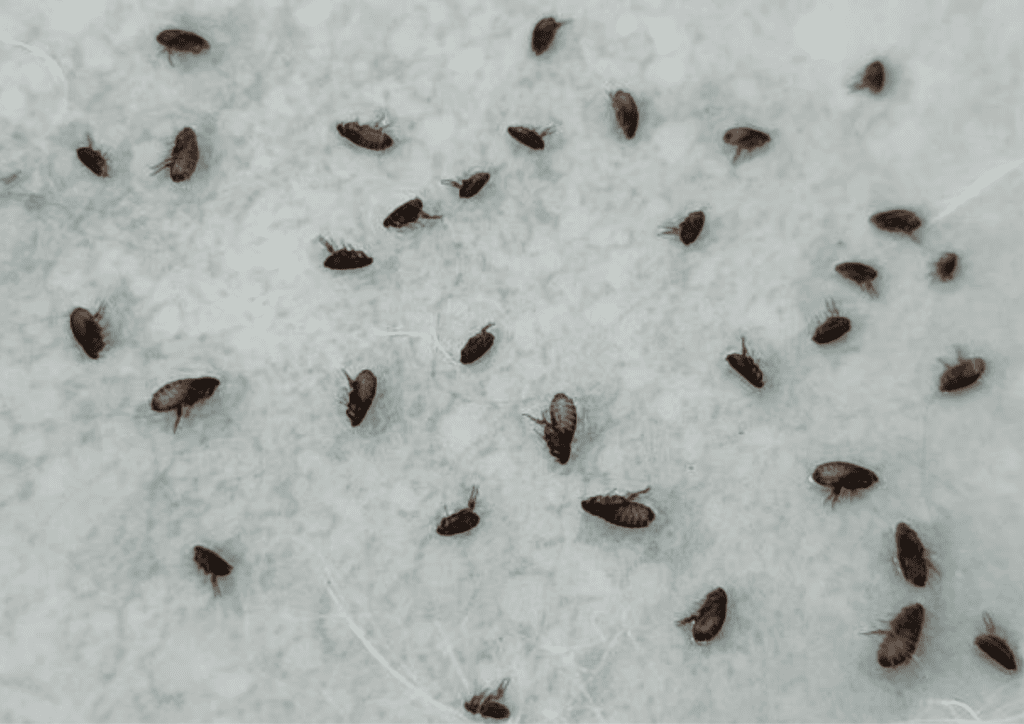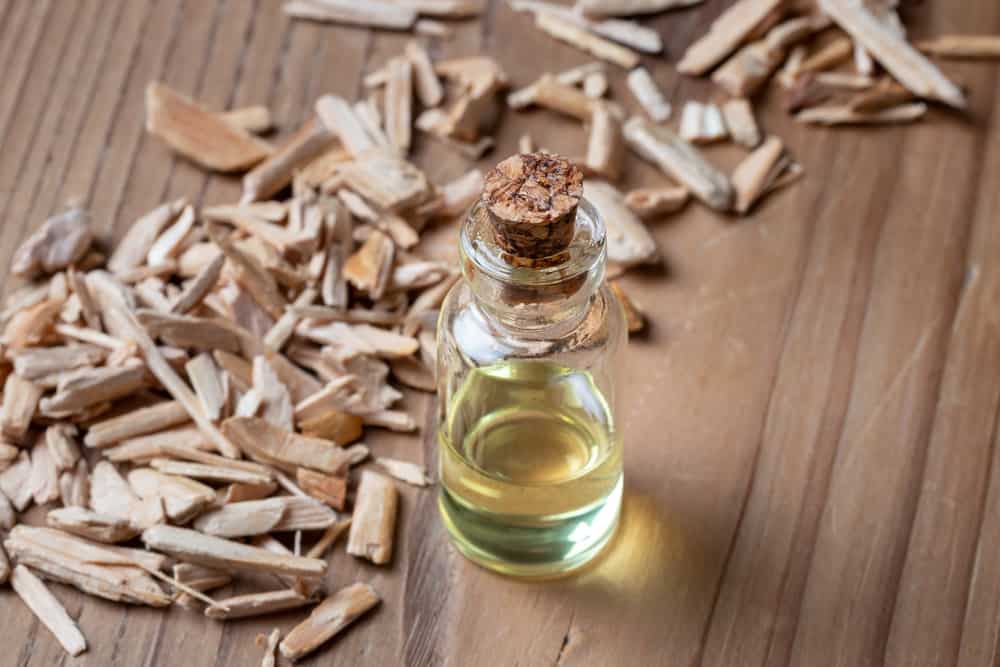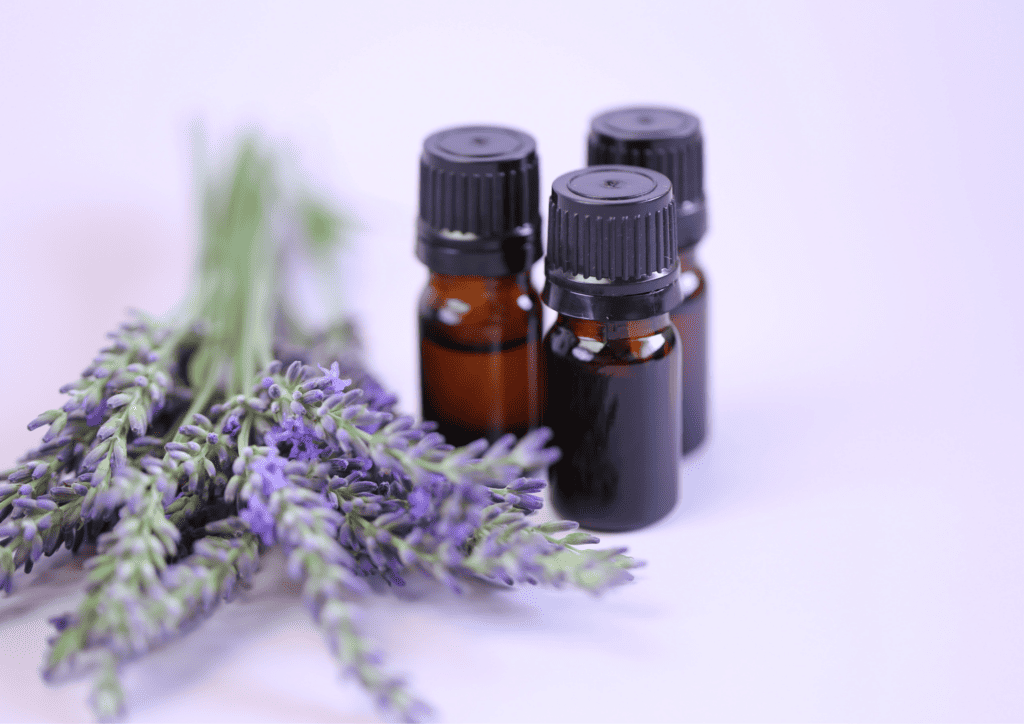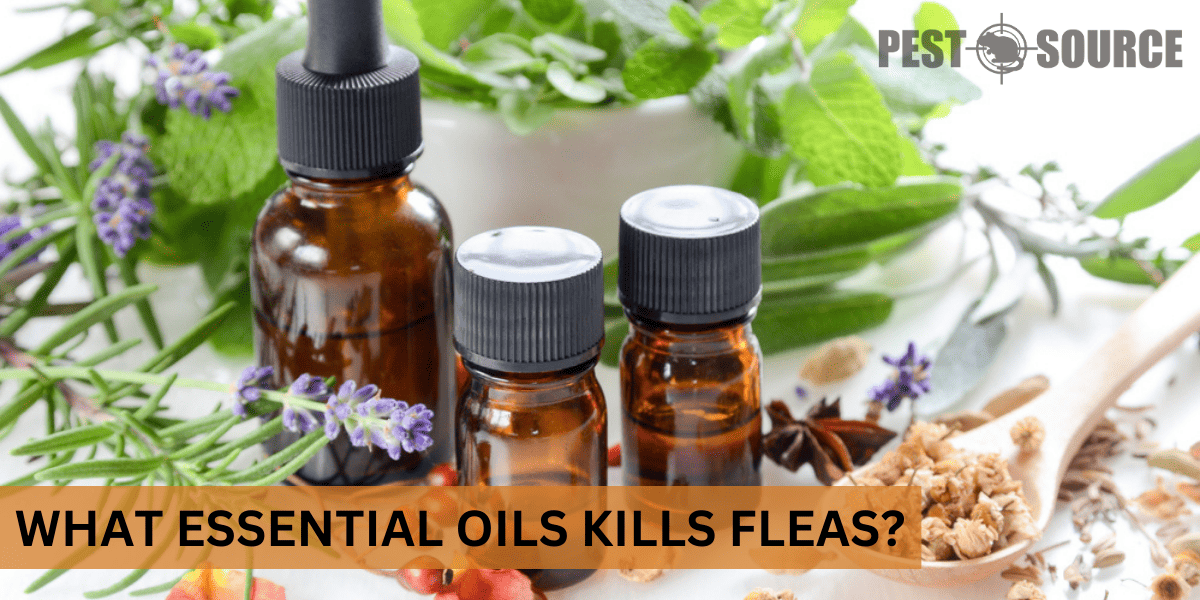Are you struggling with a flea infestation and looking for natural alternatives to chemical treatments? Essential oils may be the answer you need! These concentrated plant extracts have properties that can help in controlling fleas on your pets and in your home.
In this comprehensive guide, we will dive into the world of essential oils for flea control, exploring their efficacy, safety considerations, and application methods. Read on to discover which essential oils can help combat fleas and how to use them effectively while keeping your pets safe and comfortable.
POINTS
- Essential oils, such as cedarwood, lavender, and lemongrass, can be effective in killing or repelling fleas due to their unique chemical constituents. They offer a natural and relatively safe alternative to synthetic chemical treatments.
- Different essential oils have varying effects on fleas, with some being more effective as repellents while others can kill fleas outright. Always consider the specific properties of each oil and the intended purpose for its use.
- Essential oils can be used in various methods, such as direct application, sprays, diffusers, and homemade flea collars. However, it’s essential to use proper dilutions, consult with a veterinarian, and take safety precautions when applying essential oils on pets.
- Cats are more sensitive to essential oils than dogs and require extra caution when selecting and using essential oils. Some oils can be toxic to pets, so it’s crucial to avoid or use them with extreme care.
- While essential oils can be effective in flea control, they may not be a standalone solution. Combining essential oils with regular home maintenance, flea treatments, and veterinarian-recommended products will provide the most comprehensive and effective flea control plan.
The Role of Essential Oils in Flea Control
What are essential oils?

Essential oils are concentrated volatile liquids extracted from plants, usually through steam distillation or cold pressing. These natural compounds provide plants with protection against pests and diseases and contribute to their distinct smell and taste. Essential oils have gained popularity in recent years for their various therapeutic properties, including pest control, which makes them an attractive alternative to synthetic chemical treatments.
What are the common problems with fleas and why are essential oils used for flea control?
Fleas are small, wingless insects that feed on the blood of mammals, including pets like dogs and cats, and sometimes humans. They are not only a nuisance but can also cause skin irritation, allergic reactions, and transmit diseases. Traditional flea control methods such as pesticides and insecticides can be harmful to people and the environment, especially if used inappropriately.
Essential oils offer a natural and relatively safe alternative to these synthetic chemicals. They can kill or repel fleas without causing harm to pets or humans when used correctly. Moreover, some essential oils have soothing properties that can help alleviate itching and irritation caused by flea bites.
What Essential Oils are Effective Against Fleas?
Which essential oils have been found to kill fleas?
Several essential oils have been found to be effective at killing fleas or inhibiting their growth. Some of these oils include:
- Eucalyptus oil
- Peppermint oil
- Tea tree oil
- Lavender oil
- Cedarwood oil
- Lemongrass oil
- Neem oil
- Thyme oil
These oils contain compounds that exhibit strong insecticidal and acaricidal activities, making them effective in disrupting flea life cycles and reducing infestations.

How do essential oils affect fleas?
Essential oils have various chemical constituents that can affect fleas in different ways, from disrupting their nervous systems to repelling them effectively. Below is a table summarizing how specific compounds found in essential oils impact flea behavior and physiology:
| Essential Oil | Active Compound(s) | Effect on Fleas |
|---|---|---|
| Eucalyptus | Eucalyptol, Cineole | Toxic to fleas, disrupts respiratory system |
| Peppermint | Menthol, Menthone | Repellent, affects cold receptors leading to disorientation |
| Tea Tree | Terpinen-4-ol, Cineole | Insecticidal, damages cell membranes of fleas |
| Lavender | Linalool, Linalyl acetate | Repellent, also soothes skin irritation from bites |
| Cedarwood | Cedrol, Cedrene | Insecticidal, disrupts pheromone signaling and respiration |
| Lemongrass | Citral, Geraniol | Strong repellent, irritates fleas’ exoskeleton |
| Neem | Azadirachtin, Nimbin | Growth inhibitor, reduces flea reproduction |
| Thyme | Thymol, Carvacrol | Insecticidal, can disrupt nervous system functions |
Additionally, essential oils can provide a physical barrier that makes it difficult for fleas to move and feed, thus making the environment less hospitable for them.
Why do some essential oils work against fleas?
The effectiveness of essential oils against fleas can be attributed to their unique chemical composition. Oils that are rich in compounds like eugenol, thymol, linalool, and limonene have demonstrated particularly strong activity against fleas. These compounds can damage the fleas’ nervous systems and affect their growth and metabolism, ultimately killing them or stunting their reproduction.
What are the key differences between these essential oils and their effect on fleas?
Each essential oil has a unique combination of chemical constituents that determine how it interacts with fleas. Some oils, like eucalyptus and peppermint, have strong repellent effects, while others, like cedarwood and neem, can kill fleas outright. Certain essential oils may have additional benefits, such as relieving itchiness or preventing secondary infection from flea bites. The exact mode of action and efficacy of an oil varies, making it essential to choose the right oil or combination of oils to address specific flea-related issues.
How to Use Essential Oils to Kill Fleas?
How are essential oils typically used to kill fleas?
Using essential oils to combat fleas involves various application methods tailored to specific situations and needs. Below is a table that outlines different ways to use these oils effectively, detailing the method, suitable essential oils, and specific instructions for each application:
| Application Method | Suitable Essential Oils | Specific Instructions |
|---|---|---|
| Direct Application | Lavender, Cedarwood | Dilute with a carrier oil (such as almond or coconut oil) and apply directly to pet’s skin. Ensure proper dilution to avoid irritation. |
| Sprays | Lemongrass, Eucalyptus | Mix with water or witch hazel and spray on pet bedding and carpets to repel and kill fleas. |
| Diffusers | Peppermint, Lavender | Use in an essential oil diffuser to spread the scent throughout the home, creating a flea-repellent environment. |
| Homemade Flea Collars | Cedarwood, Lemongrass | Soak a fabric collar in a diluted solution of essential oil and water, and place it on your pet to repel fleas. |
What are the recommended application methods for using essential oils to kill fleas?

For best results, it’s important to use a combination of essential oils and application methods. Here are some recommendations:
- Apply a diluted essential oil solution directly to the affected area on your pet’s skin, avoiding their eyes, nose, and mouth.
- Use a flea comb to spread the essential oil, remove dead fleas, and distribute the oil more evenly.
- Spray essential oil solutions on pet bedding, carpets, and other infested areas regularly to control the flea population.
- Clean and vacuum your home frequently to eliminate fleas, their eggs, and larvae from your environment.
- Use a diffuser or homemade flea collar to maintain a flea-repellent environment.
Always consult with a veterinarian before using essential oils on your pet to ensure their safety and the most effective treatment plan.
Essential Oils as Flea Repellents
What essential oils are known to repel fleas?
Essential oils not only kill fleas but also serve as effective repellents to prevent infestations. Here’s a table detailing some of the most effective essential oils for repelling fleas, including their active compounds and specific repellent qualities:
| Essential Oil | Active Compounds | Repellent Qualities |
|---|---|---|
| Lavender Oil | Linalool, Linalyl acetate | Emits a soothing aroma that repels fleas and calms irritated skin |
| Lemongrass Oil | Citral, Geraniol | Strong odor that is highly unpleasant to fleas; prevents them from settling |
| Eucalyptus Oil | Eucalyptol, Cineole | Creates an environment that is inhospitable to fleas due to its intense scent |
| Peppermint Oil | Menthol, Menthone | Disorients fleas with its strong menthol scent, making it difficult for them to stay |
| Geranium Oil | Geraniol, Citronellol | Effective at deterring fleas with its strong floral scent |
| Catnip Oil | Nepetalactone | Proven to be more effective than DEET in repelling fleas, thanks to its potent scent |
| Cedarwood Oil | Cedrol, Cedrene | Not only kills but also repels fleas with its woody scent |
How do these oils repel fleas and what makes them effective as flea repellents?
These essential oils contain volatile compounds that have strong odors which are unpleasant to fleas. As a result, the fleas are deterred from living, breeding, or feeding on the areas where these oils are applied. Furthermore, some of the active compounds in these oils are toxic or irritating to the fleas, making them ineffective at locating a suitable host or laying eggs.
Can these essential oils also kill fleas or are they only effective as repellents?
Some essential oils can both kill and repel fleas, while others are more effective as repellents. For example, cedarwood and neem oil can both kill fleas and repel them, whereas lavender and lemongrass oil are better suited for repelling fleas. When choosing an essential oil, it’s essential to consider the specific properties of the oil and the intended purpose for its use.
Can essential oils be used in a flea spray for repellent purposes?

Yes, essential oils can be used in a flea spray for repellent purposes. To create a flea spray, combine a few drops of your chosen essential oil (or a combination of oils) with water or witch hazel in a spray bottle. Spray the solution on pet bedding, carpets, and other areas where fleas are known to reside. Remember to shake the bottle before each use to ensure proper distribution of the essential oils. Always test the solution on a small, inconspicuous area first to ensure it doesn’t cause any staining or damage.
Essential Oils for Flea Control in Dogs and Cats

Essential oils can be a safe and effective method for flea control in pets when used correctly. Below is a table that lists essential oils that are safe for dogs and cats, including special considerations for their use to ensure the well-being of these animals:
| Essential Oil | Safe for Dogs | Safe for Cats | Special Considerations |
|---|---|---|---|
| Lavender Oil | Yes | Use with caution | Soothing but potent; dilute properly and avoid high doses. |
| Cedarwood Oil | Yes | Yes | Generally safe; always use in low concentration. |
| Lemongrass Oil | Yes | Use with caution | Can be irritating; never use undiluted. |
| Peppermint Oil | Yes | No | Avoid use in cats due to toxicity risks. |
| Geranium Oil | Yes | No | Toxic to cats; safe for dogs in controlled amounts. |
| Rosemary Oil | Yes | Yes (chemotype verbenone) | Safe in specific chemotypes; verify before use. |
What essential oils are safe and effective for flea control in dogs?
While some essential oils can be harmful to pets, several oils are safe and effective for flea control in dogs when used in appropriate dilutions. Some examples include Lavender, Cedarwood, Lemongrass, Peppermint, and Geranium oils. Be sure to consult with your veterinarian before using essential oils on your dog, as individual animals might have specific sensitivities or needs.
What essential oils are safe and effective for flea control in cats?
Cats are more sensitive to essential oils than dogs due to their unique liver metabolism, which makes it difficult for them to process certain compounds found in essential oils. However, some essential oils are considered safer for flea control in cats, including Cedarwood, Lemongrass, and Rosemary oil. Always use essential oils in low dilutions and check with your veterinarian before using any essential oils on your cat.
Are there any essential oils that should be avoided in dogs and cats?
When using essential oils for flea control, it’s crucial to be aware of which oils may pose risks to dogs and cats. The table below highlights essential oils that should be avoided or used with extreme caution to ensure the safety of your pets:
| Essential Oil | Should be Avoided in Dogs | Should be Avoided in Cats | Reasons for Avoidance |
|---|---|---|---|
| Tea Tree Oil | Use with caution | Yes | Highly toxic to cats, can be risky in dogs if misused. |
| Pennyroyal Oil | Yes | Yes | Extremely toxic to both dogs and cats. |
| Cinnamon Oil | Use with caution | Yes | Can be irritant, potentially toxic to cats. |
| Clove Oil | Use with caution | Yes | Potentially toxic and very irritating to cats. |
| Thyme Oil | Use with caution | Yes | Can be toxic due to high phenol content. |
| Eucalyptus Oil | Use with caution | Yes | Can be overwhelming and toxic to cats. |
| Peppermint Oil | Use with caution | Yes | Irritant to dogs, toxic to cats. |
| Citrus Oils (e.g., Lemon, Orange) | No | Yes | Generally disliked by dogs, toxic to cats. |
Are there specific essential oils that dogs or cats dislike, but fleas hate?
In general, essential oils that are effective at repelling or killing fleas are usually unappealing to cats and dogs. However, they can tolerate some of these oils when used in appropriate dilutions and under a veterinarian’s guidance.
The Role of Specific Essential Oils in Flea Control
How effective is cedarwood oil against fleas?

Cedarwood oil is known to be effective against fleas due to its insecticidal and repellent properties. It contains compounds like cedrol and cedrene, which can kill fleas and disrupt their growth and reproduction. It is safe for use on both dogs and cats when properly diluted under a veterinarian’s guidance.
What is the efficacy of lavender oil in flea control?

Lavender oil is primarily effective as a flea repellent rather than a killer. Its soothing properties can also help alleviate discomfort and irritation from flea bites. Although lavender oil is safe for use on dogs, it should be used with caution on cats due to their sensitivity to essential oils.
How does lemongrass oil work against fleas?

Lemongrass oil contains compounds like citral and geraniol, which have strong repellent properties for fleas. This oil is effective at keeping fleas away from pets and their habitats. Like lavender oil, lemongrass oil is safe for use on dogs, but it should be used with caution on cats.
What are the benefits and drawbacks of using these specific oils for flea control?
The benefits of using essential oils for flea control include:
- Their natural origin
- Low toxicity to pets and humans
- Their various additional benefits, such as soothing properties for irritated skin.
However, drawbacks can include:
- Potential sensitivity to certain oils
- The need for proper dilution and application
- Possible limited efficacy compared to synthetic chemical treatments.
Can Essential Oils Completely Get Rid of Fleas?
How effective are essential oils in completely eliminating fleas?

While essential oils can play a significant role in flea control, they may not be a standalone solution for completely eliminating fleas. Essential oils are most effective when used in conjunction with other flea control measures, such as regular vacuuming, cleanliness, and washing pet bedding frequently.
Are essential oils a standalone solution or should they be used in conjunction with other flea control methods?
Essential oils should be considered one component of an integrated flea control plan, as they may not be potent enough to eradicate fleas entirely on their own. Combining essential oils with other control methods, such as regular home maintenance and flea treatments recommended by a veterinarian, provides the most comprehensive approach to flea management.
What precautions should be taken when using essential oils to get rid of fleas?

When using essential oils for flea control, take the following precautions:
- Consult with a veterinarian before using essential oils on your pets to ensure safety and effectiveness.
- Use proper dilutions to avoid irritating or harming your pets.
- Conduct a small patch test on your pets before full application to check for any adverse reactions.
- Avoid using oils known to be toxic or harmful to your pets.
- Keep essential oils out of pets’ reach and stored in a cool, dark place.
Conclusion
What are the overall benefits and drawbacks of using essential oils for flea control?
Essential oils offer a natural, relatively safe, and effective alternative to chemical flea treatments. They have the potential to kill fleas, repel them, and alleviate some flea-associated issues, including itchiness and irritation. However, they may not be a standalone solution and should be used alongside other flea control methods for the best results. It is crucial to consult with a veterinarian and take necessary precautions when using essential oils for flea control.
Can essential oils completely replace traditional flea control methods?
While essential oils can play a significant role in controlling fleas, they should not be considered a complete replacement for traditional flea control methods. Instead, think of essential oils as a supplemental approach to help reduce flea populations and create a less hospitable environment for these pests. Combining essential oils with regular home maintenance, flea treatments, and veterinarian-recommended products will provide the most comprehensive and effective flea control plan.



